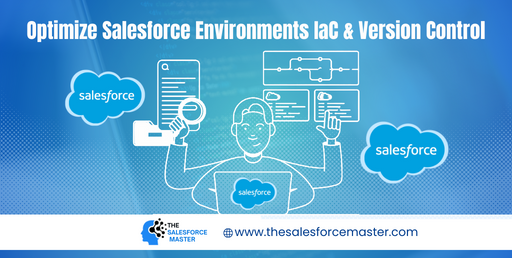
Streamlining Salesforce Environments: Leveraging IaC and Version Control
In today’s dynamic Salesforce ecosystem, optimizing environments is pivotal for seamless operations. By embracing Infrastructure as Code (IaC) and robust version control practices, Salesforce Marketers can elevate efficiency and scalability while minimizing errors and redundancies.
Embracing Infrastructure as Code (IaC): To begin with, transitioning towards Infrastructure as Code empowers Salesforce Marketers to automate environment provisioning and configuration.
Implementing IaC allows for the creation of reproducible environments, ensuring consistency across development, testing, and production stages. This fosters agility and reliability in deploying changes, aligning with the iterative nature of Salesforce marketing campaigns.
Salesforce Marketers can harness IaC tools like Terraform or AWS CloudFormation to define infrastructure components programmatically, streamlining environment setup and reducing manual errors.

Implementing Robust Version Control: Furthermore, integrating version control into Salesforce environments establishes a single source of truth for configurations and customizations, facilitating collaboration and mitigating risks.
Utilizing version control systems such as Git enables Salesforce Marketers to track changes, roll back modifications, and collaborate seamlessly across distributed teams. This ensures transparency and accountability in the development lifecycle, enhancing productivity and code quality.
By adopting version control best practices like branching strategies and pull request workflows, Salesforce Marketers can efficiently manage changes and enforce code review processes, promoting code consistency and reliability.
Continuous Integration and Deployment (CI/CD) Pipelines: Additionally, establishing CI/CD pipelines automates the integration, testing, and deployment of Salesforce configurations and customizations, fostering agility and reducing time-to-market.
Integrating CI/CD tools like Jenkins or CircleCI streamlines the delivery pipeline, enabling Salesforce Marketers to automate repetitive tasks and validate changes rapidly. This accelerates the feedback loop, facilitating iterative improvements and ensuring the delivery of high-quality solutions.
Salesforce Marketers can leverage CI/CD pipelines to automate testing procedures, including unit tests and integration tests, ensuring the stability and reliability of Salesforce deployments.
Conclusion:
In conclusion, by embracing Infrastructure as Code, robust version control practices, and CI/CD pipelines, Salesforce Marketers can optimize their environments for agility, reliability, and scalability. Embracing these practices empowers teams to adapt swiftly to changing business requirements while maintaining the integrity and efficiency of their Salesforce implementations.
For more updates about the articles, subscribe to www.thesalesforcemaster.com



